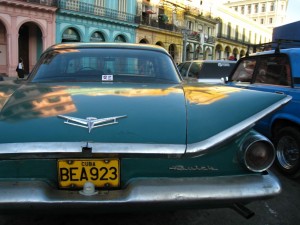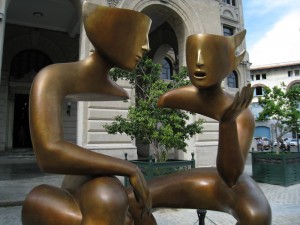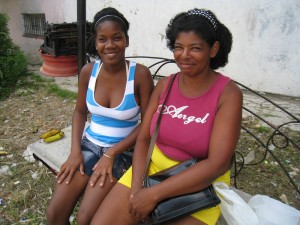Cuba (Almost) Libre
Havana, Cuba – 4/12/2015 – I imagine that people living in places like these – people living under dictatorships, treated alternately as fellow revolutionaries and as children – hear a lot of promises. Things will be glorious, or they will be difficult, but they will always change for the better. So I reckon it’s not surprising that the Cubans we’re seeing and meeting are not falling out of their chairs with delight at the promise of renewed US-Cuba ties, or that they are even really reacting at all yet. Polite smiles when we bring up the handshake between Barack and Raul, but the Cubans have seen a lot of handshakes. And so have we all.
It’s more crowded here, for sure, but of course that could mean anything. The swell in tourists might represent mainly Latin Americans and Canadians and Germans, it’s not as if the groups wandering along Obispo or crowding the bar of the La Bodeguita del Medio are waving American flags. There’s no doubt the tourism economy is surging, and that there are more shops and boutiques than I remember from last time. But the Cubans we’re talking to—from people on the street to guides to artists—definitely seem cautious about the prospect of normalized relations. No doubt this week’s visit by Obama to Panama, and the pending announcement of Cuba’s removal from the terrorist list (and they damned well better remove it), will make it feel like the wheels are in motion.
One thing I am noticing is the increased number of smart phones. The young people sitting along the sea wall of the Malecon are as engaged with each other as ever—almost. But I’d say that in many of the little social groups, as many as one out of every five, there is one person sitting apart, head down, face lit by the pastel glow of a device. Seeing that has given me my first uncomfortable sense of where things might be going. Everyone focuses on the potential proliferation of McDonalds and Starbucks, the invasion of WalMart, the cynically inevitable capitalization of Cuba. But what I saw last night was a more likely vision of the city in three or four years: hundreds of young Cubans sitting together but separately, necks bent and heads canted slightly away from each other, as a thousand tiny screens dancing against the dark Gulf like fireflies.
 I hope not. But after just three days here, it is very clear that the real celebrations will start taking place when two things happen. First, the Internet has got to be made reliable, efficient and cheap. Second, the long embargo must be lifted so that the free flow of goods—the kinds of goods that will help Cuba join the modern world —can begin. That’s when the handshakes will mean something, and fifty years of hand-wringing can end.
I hope not. But after just three days here, it is very clear that the real celebrations will start taking place when two things happen. First, the Internet has got to be made reliable, efficient and cheap. Second, the long embargo must be lifted so that the free flow of goods—the kinds of goods that will help Cuba join the modern world —can begin. That’s when the handshakes will mean something, and fifty years of hand-wringing can end.


